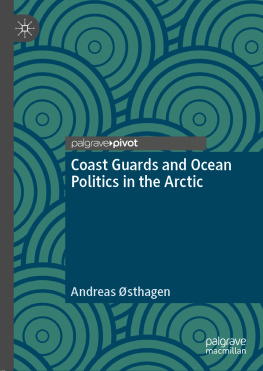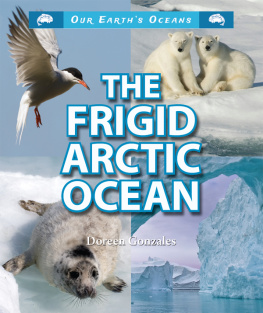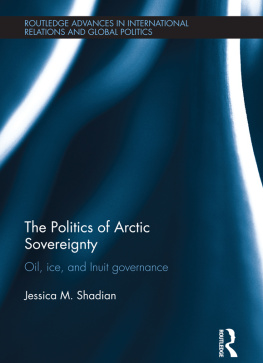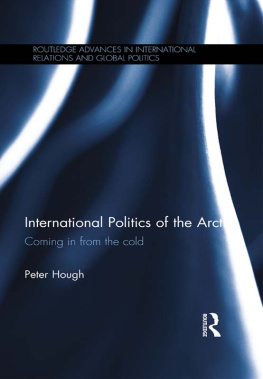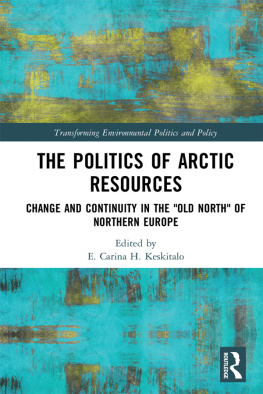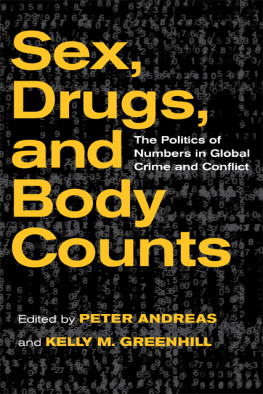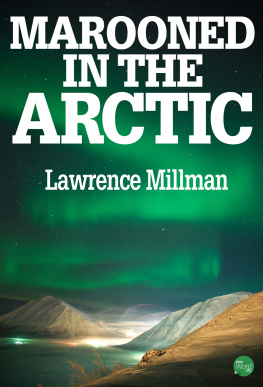Andreas Østhagen - Coast Guards and Ocean Politics in the Arctic
Here you can read online Andreas Østhagen - Coast Guards and Ocean Politics in the Arctic full text of the book (entire story) in english for free. Download pdf and epub, get meaning, cover and reviews about this ebook. year: 2020, publisher: Springer Singapore, genre: Politics. Description of the work, (preface) as well as reviews are available. Best literature library LitArk.com created for fans of good reading and offers a wide selection of genres:
Romance novel
Science fiction
Adventure
Detective
Science
History
Home and family
Prose
Art
Politics
Computer
Non-fiction
Religion
Business
Children
Humor
Choose a favorite category and find really read worthwhile books. Enjoy immersion in the world of imagination, feel the emotions of the characters or learn something new for yourself, make an fascinating discovery.
- Book:Coast Guards and Ocean Politics in the Arctic
- Author:
- Publisher:Springer Singapore
- Genre:
- Year:2020
- Rating:5 / 5
- Favourites:Add to favourites
- Your mark:
- 100
- 1
- 2
- 3
- 4
- 5
Coast Guards and Ocean Politics in the Arctic: summary, description and annotation
We offer to read an annotation, description, summary or preface (depends on what the author of the book "Coast Guards and Ocean Politics in the Arctic" wrote himself). If you haven't found the necessary information about the book — write in the comments, we will try to find it.
Coast Guards and Ocean Politics in the Arctic — read online for free the complete book (whole text) full work
Below is the text of the book, divided by pages. System saving the place of the last page read, allows you to conveniently read the book "Coast Guards and Ocean Politics in the Arctic" online for free, without having to search again every time where you left off. Put a bookmark, and you can go to the page where you finished reading at any time.
Font size:
Interval:
Bookmark:
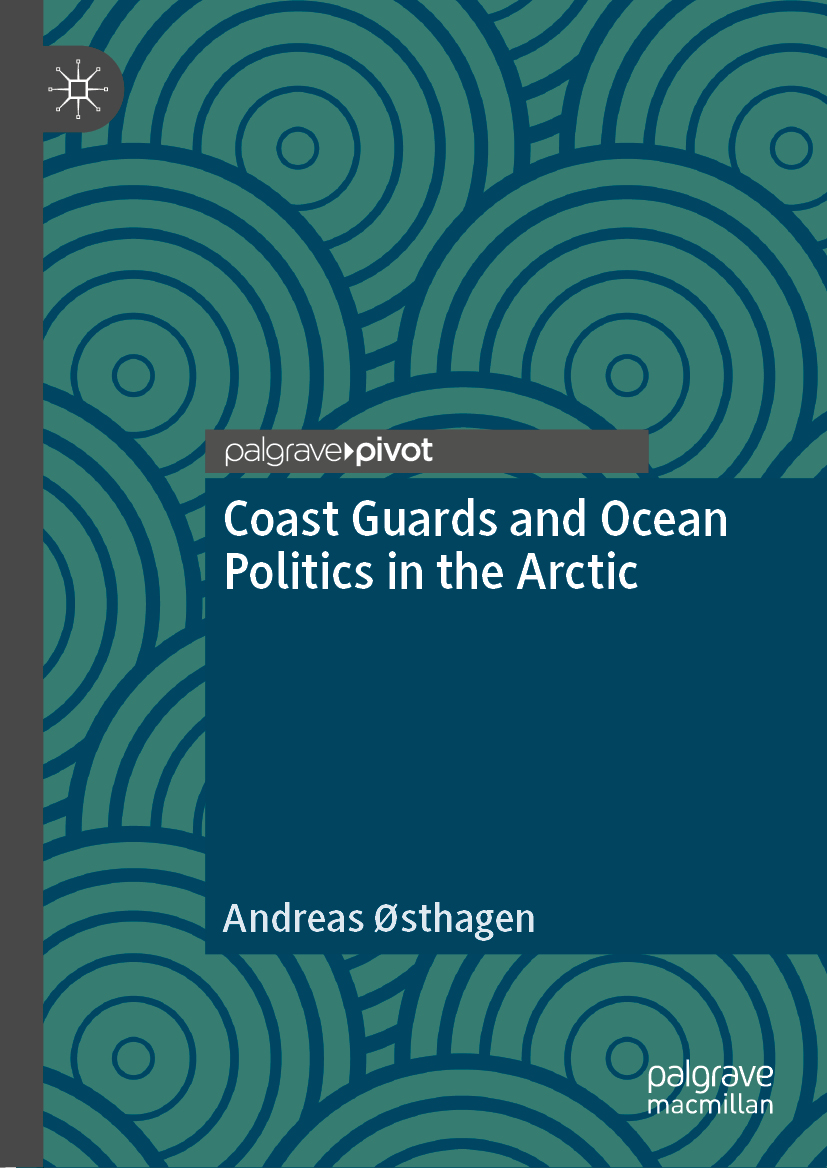

Cover illustration: John Rawsterne/patternhead.com
This Palgrave Pivot imprint is published by the registered company Springer Nature Singapore Pte Ltd.
The registered company address is: 152 Beach Road, #21-01/04 Gateway East, Singapore 189721, Singapore
This book is about coast guard, their role in the Arctic, and in ocean politics and resource management more generally. It is based on my years of writing about coast guards, from multiple projects at various institutions. This work started in 2014 at the Norwegian Institute for Defence Studies in Oslo, funded by the Norwegian Ministry of Defence. It continued at the University of British Columbia in Vancouver from 2015 to 2017, related to my doctoral thesis on maritime boundaries and maritime conflict, although this is only slightly related to that work. Finally, work on coast guards was concluded at the Fridtjof Nansen Institute in Oslo from 2017 to 2019, where various projects funded by the Ministry of Defence as well as the Norwegian Research Council enabled me to expand on the topic of coast guards in the Arctic.
This book is predominantly previously unpublished material, although it is also based on previously published articles and reports, albeit presented in a different way and with a new approach. Parts of Andreas sthagen. 2016. High North, Low Politics Maritime Cooperation with Russia in the Arctic. Arctic Review on Law and Politics 7 (1): 83100 and Andreas sthagen. 2018. Managing Conflict at Sea: The Case of Norway and Russia in the Svalbard Zone. Arctic Review on Law and Politics 9: 100123 are here used in Chapters .
This book and the work that it is based on, is only possible because public officials willingly take their time to meet and discuss the range of topics that this book covers. The different coast guard services, and especially the Norwegian Coast Guard, the Icelandic Coast Guard and the United States Coast Guard, have been very forthcoming with sharing of information and willingness to be interviewed. In addition, various foreign and defence ministries in the Arctic countries have also been ready to discuss these topics at length, for which I am very grateful.
There are also a number of people that deserve my acknowledgement and gratitude, having helped me to complete this book. The foundation for this book came through my position at the Norwegian Institute for Defence Studies in Oslo, starting already in 2014. Colleagues such as Paal Sigurd Hilde, Kristine Offerdal, Robin Allers, Hkon Lunde Saxi, Ingrid Lundestad, Ida Maria Oma, Roald Gjelsten, and Rolf Tamnes provided valuable perspectives and guidance. My supervisor at the University of British Columbia, Michael Byers, has also guided me through the intersection of international relations and international law. Further, my colleagues at the Fridtjof Nansen Institute, and especially Geir Hnneland, Svein Rottem, Arild Moe, ystein Jensen, and Anne-Kristin Jrgensen, have willingly shared their knowledge and experience helping this book take form.
Finally, I must thank my family and friends for their eagerness and support, every time I launch a new project. Especially my wife, Victoria, must endure longwinded discussions and explanations of recent projects. Without such support this would not be possible, and for that, I am truly grateful.
is a Senior Fellow at the Fridtjof Nansen Institute (FNI) in Oslo, Norway, a world leading research institute concerned with international relations, Arctic affairs, and resource management. His research looks at Arctic geopolitics and ocean governance, hereunder maritime disputes and resource management. sthagen is also a Senior Fellow at The Arctic Institute and an Advisor at the High North Center for Business and Governance at Nord University. He has previously worked for the Norwegian Institute for Defence Studies and the North Norway EU Office in Brussels. sthagen holds a Ph.D. from the University of British Columbia, an M.Sc. from the London School of Economics and a B.A. from the Norwegian University of Science and Technology.
This introduction makes use of an examplethe Elektron-caseto outline the growing importance of coast guard affairs in the Arctic and more generally across the oceans. What rights do states have at sea? How did these come about? What is the room for international cooperation between different countries on coast guard tasks? Why do states choose to cooperate at sea in the first place? These are the overarching questions tackled in this book and outlined in the introduction. This coincides with three trends being explored in this chapter and the book at large, namely the changes occurring at sea in the Arctic, the increasing demand for international cooperation in dealing with these changes, and finally changes occurring in ocean politics more generally.
Font size:
Interval:
Bookmark:
Similar books «Coast Guards and Ocean Politics in the Arctic»
Look at similar books to Coast Guards and Ocean Politics in the Arctic. We have selected literature similar in name and meaning in the hope of providing readers with more options to find new, interesting, not yet read works.
Discussion, reviews of the book Coast Guards and Ocean Politics in the Arctic and just readers' own opinions. Leave your comments, write what you think about the work, its meaning or the main characters. Specify what exactly you liked and what you didn't like, and why you think so.

